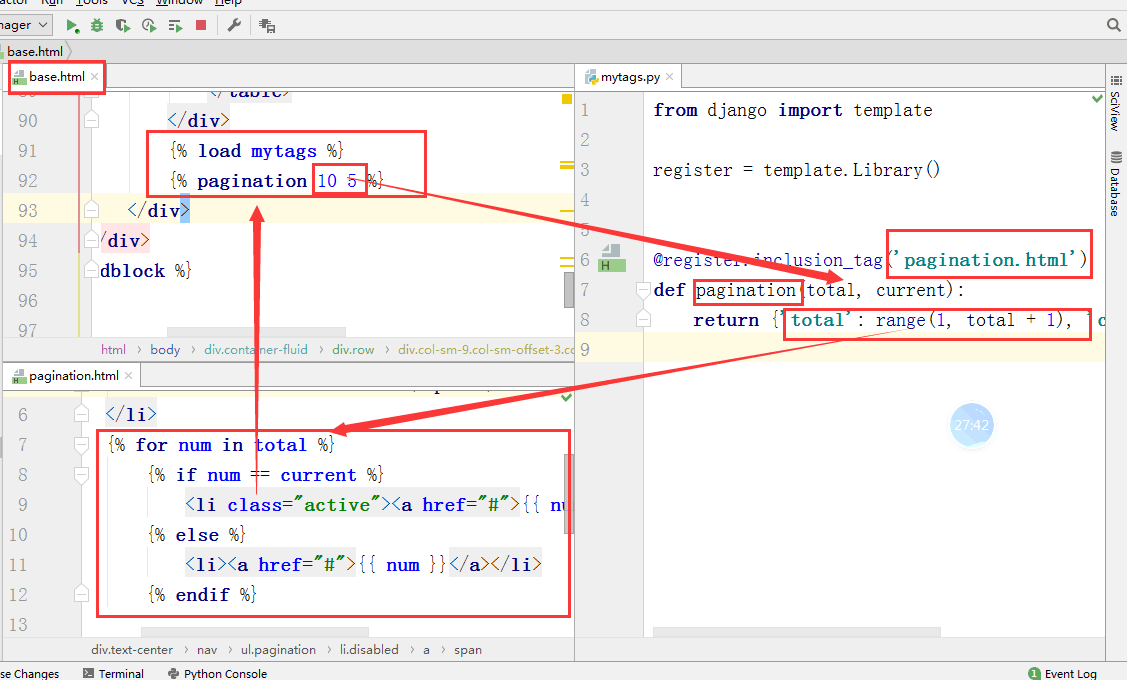tags
for 循环
格式:
<ul>
{% for user in user_list %}
<li>{{ user.name }}</li>
{% endfor %}
</ul>
for 循环可用的参数;
forloop.counter 从当前的索引值 从1
forloop.counter0 从当前的索引值 从0
forloop.revcounter 当前的倒序索引值 从1
forloop.revcounter0 当前的倒序索引值 从0
forloop.first 当前循环是不是第一次循环(布尔值)
forloop.last 当前循环的是不是最后一次(布尔值)
forloop.parentloop 本层循环的外层循环
可以嵌套很多层
for ...... empty
<ul>
{% for user in user_list %}
<li>{{ user.name }}</li>
{% empty %}
<li>空空如也</li>
{% endfor %}
</ul>
if ,elif ,else
if 判断5>2>1 时和python的不一样 它是先对比前边得到值后对比后边
{% if user_list %}
用户人数:{{ user_list|length }}
{% elif black_list %}
黑名单数:{{ black_list|length }}
{% else %}
没有用户
{% endif %}
判断商的时候用 divisibleby:数字
if语句支持 and 、or、==、>、<、!=、<=、>=、in、not in、is、is not判断。
with 起名
#{% with p_list.0.name as chenrun %}#}
{##}
{# {{ chenrun }}#}
{# {{ chenrun }}#}
{# {{ chenrun }}#}
#{% endwith %}#}
csrf_token
不用在setting引掉的csrf
注意事项:
1不能连续判断
2,django 的模板语言中的属性的优先级大于方法
. tags
2. 母版和继承
1. 母版
就是一个普通的HTML文件,提取多个页面的公共部分
减少代码量 修改十分方便
定义block块
2. 使用(继承)
在子页面中
{% entends 'base.html' %}
重新修改block块中的内容
3. 注意事项:
1. 把{% extends 'base.html' %} 写在第一行
2. 修改的内容写在block中,写在外面不显示
3. {% extends name %} name应该是变量 或者是字符串 继承母版的名字
4. 母版中定义多个block块,一般还有 js 块 和 css块
3. 组件
1. 就是一小段HTML代码 多个页面都用到的内容 nav.html
2. 在任意的模板中使用
{% include 'nav.html' %}
4. 静态文件相关
1. {% load staticfiles %} 或者 {% load static %}
2. {% static 'css/pub.css' %} ——》 先去settings中获取STATIC_URL的配置,和后面提供的参数进行拼接
1. {% load static %}
2.
<link rel="stylesheet" href="{% get_static_prefix %}css/pub.css">
5. 自定义simpletag和自定义inclusion_tag
1. 在app下创建一个名叫templatetags的python包
2. 在templatetags里建一个py文件
3. 在py文件中编辑:
from django import template
register = template.Library()
@register.simple_tag
def join_str(arg1, arg2, arg3,*args,**kwargs):
print(args)
print(kwargs)
return '_'.join([arg1, arg2, arg3])+'*'.join(args)
@register.inclusion_tag('pagination.html')
def pagination(total, current):
return {'total': range(1, total + 1), 'current': current}
4,
使用:
{%load mytags%}
{{变量|dsb:'参数'}} filter
{%add_b ''%}simple_tag
{%show_li 5%}inclusion_tag
注意特殊的inclusion_tag

执行的顺序需要注意先从html中获取参数,进入到函数中,进行调用另一个封装好的html,并且把参数传递给后者的html.